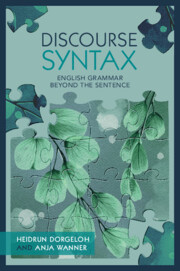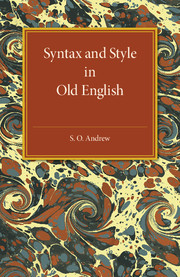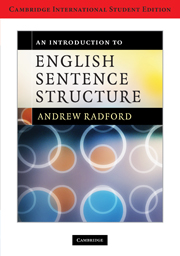Discourse Syntax
Discourse Syntax is the study of syntax that requires an understanding of the surrounding text and the overall discourse situation, including considerations of genre and modality. Using corpus data and insights from current research, this book is a comprehensive guide to this fast-developing field. It takes the reader 'beyond the sentence' to study grammatical phenomena, like word order variation, connectives, ellipsis, and complexity. It introduces core concepts of Discourse Syntax, integrating insights from corpus-based research and inviting the reader to reflect on research design decisions. Each chapter begins with a definition of learning outcomes, provides results from empirical articles, and enables readers to critically assess data visualization. Complete with helpful further reading recommendations as well as a range of exercises, it is geared towards intermediate to advanced students of English linguistics and it is also essential reading for anyone interested in this exciting, fast-moving discipline.
- Includes topics from both syntax and discourse/register studies, and shows how these disciplines interact, to enable students to move from the analysis of sentences to the analysis of texts
- Integrates insights from current research in a digestible form, with charts and empirical results from classic and current research articles
- Guides students to apply concepts to real syntactic usage and to develop research questions and projects
Reviews & endorsements
‘… reader-friendly and highly practical.’ Ziheng Zhou, Discourse Studies
‘… an excellent resource for developing skills and understanding in providing discursive interpretations of syntactic configurations.’ Pablo M. Tagarro, Folia Linguistica
‘We need more books like this to help students make the jump to independent research.’ James Donaldson, English Language and Linguistics
Product details
October 2022Paperback
9781108457040
320 pages
228 × 151 × 19 mm
0.51kg
Available
Table of Contents
- List of Figures
- List of Tables
- Acknowledgements
- 1. Introduction
- 2. Concepts, Data, and Methods
- 3. Non-Canonical Beginnings
- 4. Variation in the Middle
- 5. Special Endings
- 6. Connectives
- 7. Pronouns and Ellipsis
- 8. Discourse Markers
- 9. Grammar and Genre
- References
- Index.






